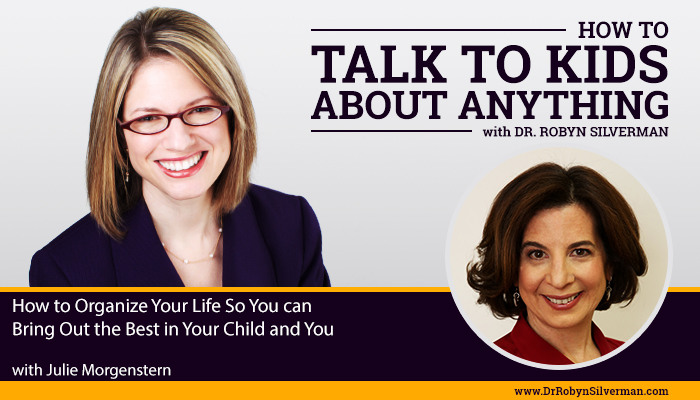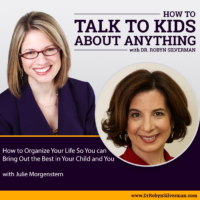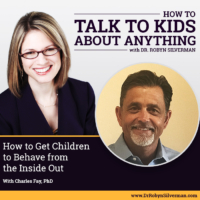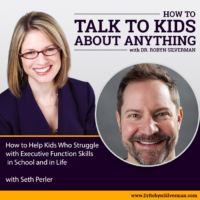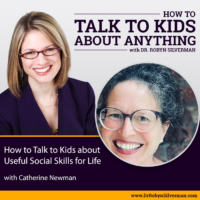Podcast: Play in new window | Download
Subscribe: Apple Podcasts | RSS | More
How to Organize your Life so You Can Bring Out the Best in Your Child and You
This podcast will focus on how to organize your time, as a parent, so that we can shift our attention from trying to “have it all” to getting it right in the moment. When parents can learn how to balance their abilities to provide, arrange, relate and teach— and know when to go all out, when to ask for help, when to delegate and what only that parent can do, everyone will feel more fulfilled and calm even when life gets crazy. Time management is good for everyone involved— and understanding that short bursts of undivided attention might be the secret to calming the chaos.
Parents have struggled with how to manage their time for generations. There is so much to do— so much to balance! In the age of 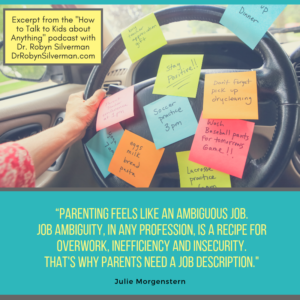 extracurriculars— from travel baseball, soccer, gymnastics, piano, to tutoring classes, art and enrichment, the question of how to fit everything in, complete the car pool, get dinner on the table, help with homework, get to the store, get some work done, give your kids undivided attention—and still take care of yourself—seems nearly impossible. How do we do this? DO we do all of this? To hold our hands and help us all shift from having it all to getting it right in the moment— is best-selling author, Julie Morgenstern.
extracurriculars— from travel baseball, soccer, gymnastics, piano, to tutoring classes, art and enrichment, the question of how to fit everything in, complete the car pool, get dinner on the table, help with homework, get to the store, get some work done, give your kids undivided attention—and still take care of yourself—seems nearly impossible. How do we do this? DO we do all of this? To hold our hands and help us all shift from having it all to getting it right in the moment— is best-selling author, Julie Morgenstern.
Julie Morgenstern is the author of Time to Parent, and five previous books, including the New York Times bestsellers Organizing from the Inside Out and Time Management from the Inside Out. She is an internationally renowned organization consultant and sought after speaker who has shared her expertise on The Oprah Winfrey Show, The Today Show, and more. Julie has helped thousands of people transform their homes, businesses, and attitudes about every kind of clutter. The New York City-based Julie Morgenstern Enterprises has been successfully in business for over 25 years.
The podcast provides:
- Why we need a job description as a parent
- What the job description should be
- How the job description can inform out to-do list and how we can apply this framework
- What the principle of Max-Min-Mod means and how it can help us
- Tips to minimize stress and overwhelm
- How to cope with the “one-more-thing” tendency
- How to incorporate “me-time” into your day and why this is important
Important Messages:
 Parenting— time stretched years. Conflicting priorities.
Parenting— time stretched years. Conflicting priorities.- Parents often don’t know the edges of the job— how do you divide your time? What do you do? The job feels ambiguous.
- We need a parenting job description to see where the edges are, where strengths are, where the holes are. Then you can adapt and adjust.
- We all gravitate away from the things we don’t feel good at doing and towards the things where we feel more confident.
- Some want to be the opposite of their parents so they compensate in the other direction.
- Job description: Provide, arrange, relate, teach. Many parents high on provide and arrange and low relate and teach. Provide and arrange take more time.
- The parenting job is bigger than any one human can do. We think we should and can do it all. We need to delegate.
- Women have the lion share of “arrange.” But it’s the most delectable skills/tasks. Nobody can take your place in “relate.”
- Who doesn’t want to hear from their parent that they matter?
- You don’t have to do it all to be likable and worthy.
- The enemy to efficiency is perfectionism. There is not time to do everything perfectly.
- For any task on your list that threatens to monopolize your time. Define three levels of performance. What does perfect look like? What’s the minimum I can do that still gets the job done? The middle is the moderate. You can still achieve the goal— but with three levels of performance.
- Watch feeling like you need to do “one more thing.”
- You need relationship, connection and joy during the parenting years— it’s not all about one more thing! You’ll miss the pleasure.
- We create guilt when we take self time. This is about being a human being.
- Also- kids mimic what you see. You need to model happy, healthy human!
- You are to gaining anything by depriving yourself of sleep and doing one more thing.
- Sleep can not be your only form of self care.
- Two things that keep us from practicing self care is guilt and our approach. Smaller packets of time, frequently delivered rather than small blocks of time, delivered occasionally. Short bursts.
- The couples who had the strongest marriages while raising kids mastered these short bursts and brief check ins with their spouses. Daily glue. Three to 5 times during the day- they’d check in with the other. They were caught up during the day. They also limited the conversations around logistics- arrange. They’d do this in email. Then “arrange” didn’t take over facetime. None requires large packets of time.
- Make sure you are having fun— reading a book, painting, sitting still, getting a manicure, garden.
- It’s not healthy to be so focused on your kids that you have nothing for you— or the opposite that you are so focused on your own life that you have no connection with your kids. You must find the balance.
- We need to recognize that kids need short bursts of undivided attention delivered consistently— not long blocks of time delivered erratically.
- The first few minutes of reconnection (wake up, after school, before bed, etc) make sure you aren’t focused on what needs to get done— but just reconnect. What is your intention?
Notable Quotables:
- “We need to tame the chaos in our lives, in whatever form it takes, so that we are free to make our unique contribution.
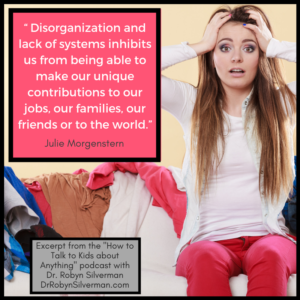 Disorganization and lack of systems inhibits us from being able to make those contributions— whether that’s to our jobs, our families, our friends or to the world.”
Disorganization and lack of systems inhibits us from being able to make those contributions— whether that’s to our jobs, our families, our friends or to the world.” - “Systems free us.”
- “Parenting— it’s the most time-stretched, conflicted priority years. How do I be there for my kids and not lose myself?”
- “Parenting feels like an ambiguous job. Job ambiguity, in any profession, is a recipe for overwork, inefficiency and insecurity. Without a roadmap, you are never satisfied and you are never done. That is the way parents have been operating for generations.”
- “Once you have a job description, you go from job ambiguity to job clarity.
- “We have to remember to slow down to the speed of children.”
- “Each parent needs to feel whole and children need to feel fulfilled.”
- “The parenting job is bigger than any one human can do. We think we should and can do it all. But we must delegate the tasks that are delegatable so we make time for the things we can not delegate.”
- “As a parent, you want to “right-size-the-task” for the situation.
- “To fuel ourselves and to have the energy, the clarity, the perspective and the patience to be able to raise another human being we need 4 things: Sleeping, Exercise, Love, and Fun.
- “The less sleep you get, the longer your to-dos take. YOu’re better off getting a full night sleep and you’ll get as much if not more done, rested, than you will when you’re sleep deprived.”
- “To be a happy, healthy human who has the energy, the heart, the soul and the perspective to nurture another, we have to be nurtured as adults too.”
- “What humans need— little humans and big humans— are short bursts of undivided attention delivered consistently.”
- “Before you cross the threshold, ask yourself, ‘what is my intention on the other side of this door?’ It’s to connect.”
- “It’s never too late to hit reset.”

